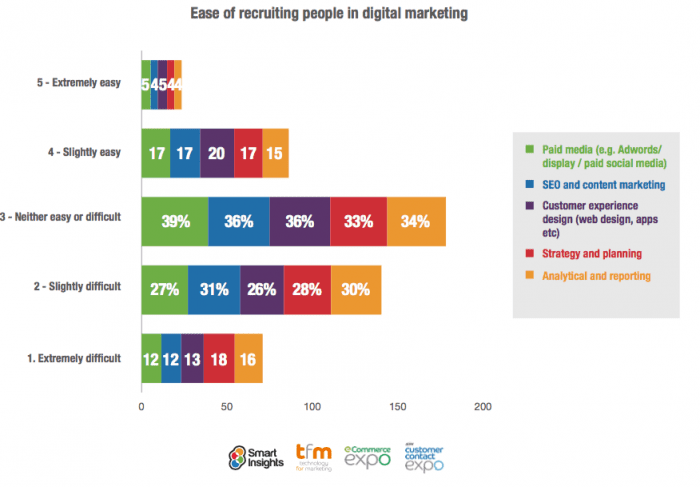As an industry, how are we finding the process of recruiting new talent?
We recently conducted some research where we asked over 700 professional marketers about their current digital skills, how they wanted to develop and what trends they saw in the industry. That research resulted in our Digital Skills report 2016 which you can find here.
When we asked "How easy is it to recruit people with the right amount of digital skills based on the experience of your organisation?" we got quite an array of answers.

On initial inspection, it clear to see that, the digital marketing industry finds recruitment more troubling than easy. Whether this is as a result of unreasonable expectations, or a flaw in the system we are using, it's something to be conscious of when looking for your next hire.
Looking at the "extremely easy" selection, most sectors are much of a likeness, with paid media and customer experience design viewed as slightly easier than the remaining three.
Similarly to extremely easy - Slightly easy has a similar spread. Again customer experience design comes out on top, this is encouraging to see as the recent initiatives particularly in the UK are possibly beginning to pay off. On the reverse side, this could also be as a result of going in with realistic expectations.
Skipping over the neither easy or difficult results, looking at the slightly difficult responses SEO and Content Marketing garnered the largest response at 31%. This could be explained by a preference to find candidates with a set amount of experience within the sectors. Following the trend of the previous responses, Customer Experience Design is the lowest rated out of the skills.
Interestingly the toughest skills to find in a new hire is the Strategy and Planning. This could come down to the fact these new employees are more likely to be entering the company in a more senior role and will need to have amassed experience in the field. Alternatively, Paid Media and SEO are best in class here 6% down on Strategy and Planning.
To see one of our recommendations on how to negate these issues, check out our Digital Skills Report 2016.







